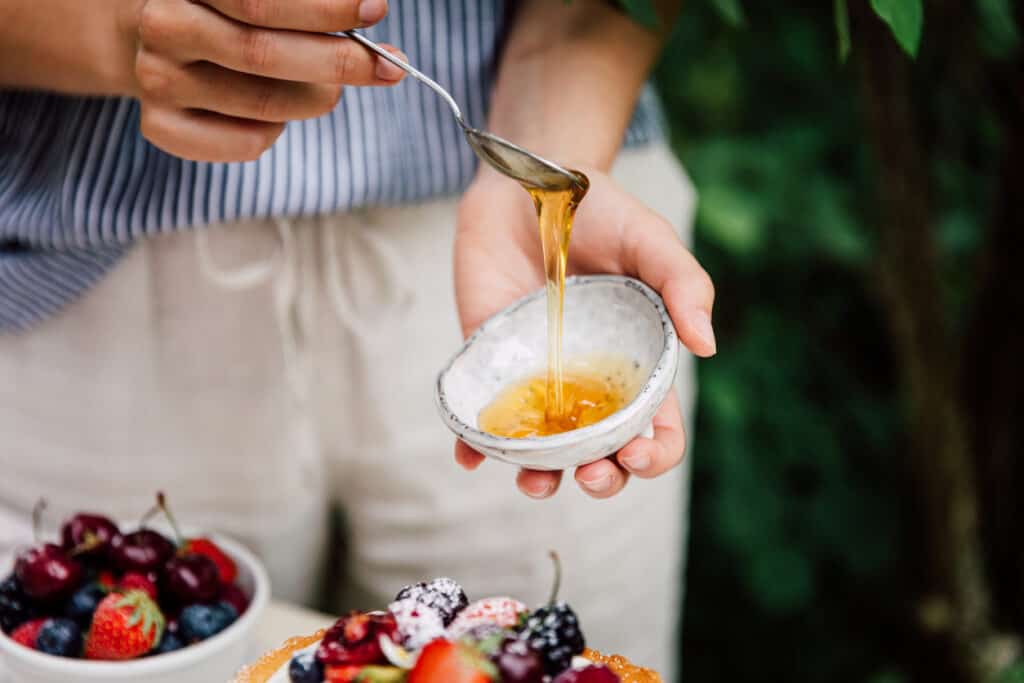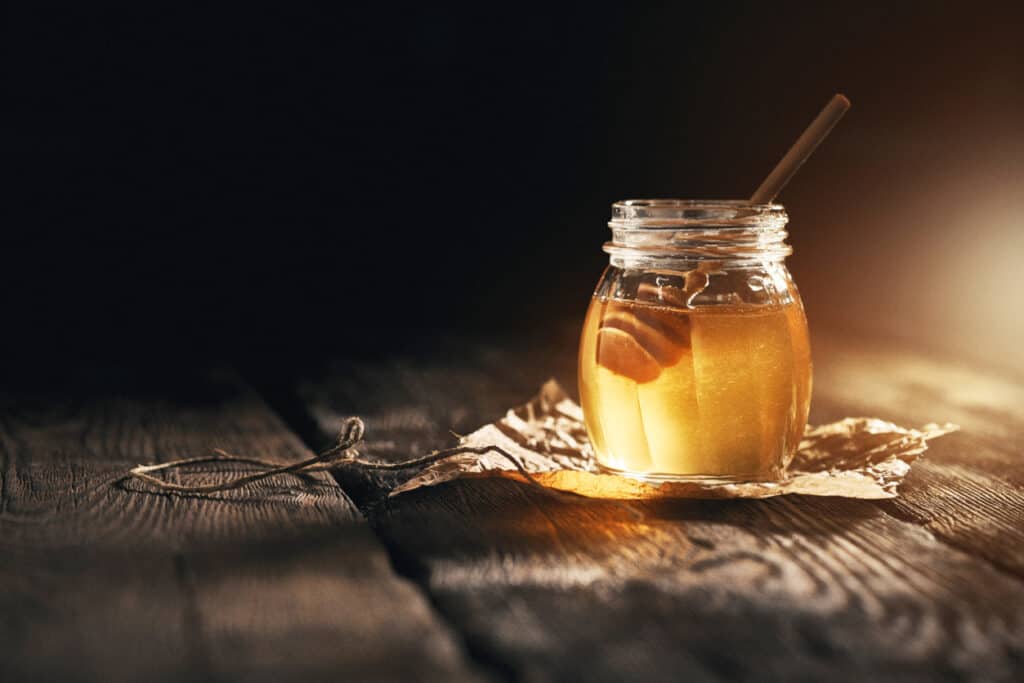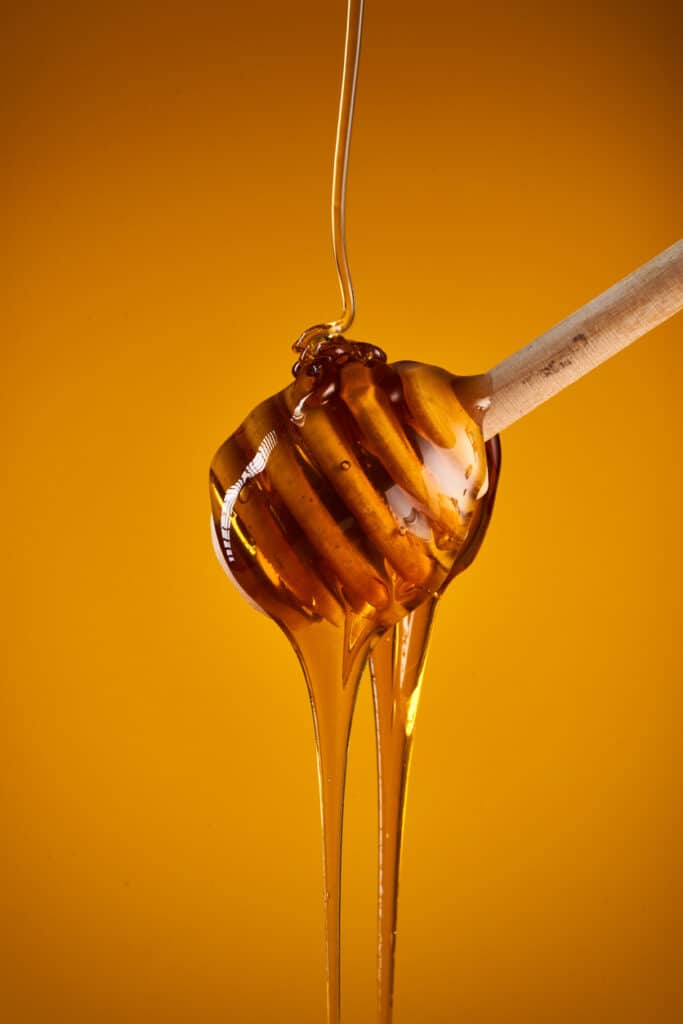Honey’s delicate flavors, pure colors, and aroma are a natural wonder. The exotic tastes of honey are straight from nature – nectars of wildflowers, fruit and nut blossoms, lavenders, and shrubs. A jar of honey, the golden nectar, is prized as a gift, symbolic of riches, and has profound nutritional and medicinal benefits. And whether honey needs to be refrigerated is at the forefront of thinking.
Honey shouldn’t be refrigerated. Pure or raw honey crystallizes in a fridge. Crystallization isn’t harmful but alters honey’s texture and taste. Honey crystallizes in the hive below 50º F. Honey is stored in dry places, away from sunlight, and in airtight jars and can last for years, even centuries.

Honey bees pollinate the earth, make honey to sustain the hive, and this ecological wonder allows us benefits too. Harvesting honey is beneficial to the bee colonies to stop overcrowding. Honey stays edible in bacteria-free spaces. Though we need to harvest conservatively, what to do to keep honey is worth considering, especially if we should refrigerate honey.
Does honey need to be refrigerated?

Decades of research analyze honey’s complex structure – how bees organize themselves, produce honey, and our uses of honey. The storage of honey is at the forefront. Keeping or storing honey has fascinated scientists as much as honey’s medicinal benefits. Harvesting this delicate, aromatic, and medical substance has fascinated apiarists and agronomists.
Humans’ symbiotic relationship with bees reaches beyond honey’s divine taste. Bees define our earth through pollination, and we keep the hive going by harvesting honey. The hardworking bees collect nectar and get pollen from plant life. Human harvests stop the hive from getting overpopulated. This staves off diseases for the bee communities. But should we refrigerate honey?
Seasonally, two to three honey harvests happen, which amounts to liters. But what happens when these are refrigerated? The simple answer is that honey shouldn’t be refrigerated. The storage matters so as not to interfere with honey’s varying tastes – the malty honey with the amber hues and the lighter eucalyptus and delicate orange blossoms that are sweeter.
Refrigeration alters the texture and the taste of honey. The consistency becomes thick and grainy. The lucid and clear look of honey as it naturally runs out of the comb becomes sugary and crystal-like. The colder temperatures cause crystallization, which also happens in nature as temperatures plummet.
In nature, processes like crystallization are different from that in a fridge, where honey will be kept constant for an extended period. Honey in a refrigerator soon loses its color – it becomes cloudy, and the texture becomes granular and sugary.
A first response might be that the honey is unusable. Some might heat honey to reverse crystallization and liquefy it. Repeated heating to de-crystalize destroys the flavor.
Don’t Store Honey in A Fridge

Scientifically what happens to honey when it’s put in the fridge is that the chemical compounds change. The change is noticeable as crystallization occurs. This is not a sign of contamination, though. When honey crystallizes, the natural sugars, glucose, and fructose change their chemical structures.
These sugars in honey (glucose and fructose) are derived from plants. When bees gather honey from the blossoms, the bees ingest these sugars or carbohydrates. Weighing up glucose and fructose, scientists have found that the glucose compounds in the honey are the ones that more readily crystalize. The rate at which crystallization happens differs according to the kinds of nectar.
The glucose content in the nectar influences the rate at which honey that’s stored at cooler temperatures crystalizes. Different plant blossoms have other glucose contents. Plants with low glucose contents like maple and blackberry nectars crystalize at a slower rate. These can be kept at cooler temperatures. Higher crystalization happens in alfalfa and clover nectars.
Honey’s chemical structure is a super-saturated compound. This means that the sugars in honey naturally change, even in the comb. This is why honey is not exposed to cold or low temperatures, specifically those of a refrigerator. Warmer spaces, not direct sunlight, slows down the rate of change and can even prevent honey’s crystallization.
How Honey’s Texture Changes With Cold Temperatures
Honey naturally has pollen, which influences the honey’s crystallization rate. Pollen also gives us an indication of the honey’s origin. The pollen is the nectar source and indicates the region the honey is from. In this sense, we can tell from the pollen in honey where the bees have gathered the nectar! The degree of pollen also indicates the rates of crystallization.
The nectar is the flavor and taste. The purest of honey is delicately fragranced. The fragrance is plant essences. Bees get pollen on their legs and store these in pollen baskets when they ingest the nectar from buds and blossoms to make honey. Pollen in honey is one of the reasons that honey crystallizes faster.
In some instances, bee farmers filter honey to get rid of pollen. In nature, honey has these pollen grains, which today are filtered out. This happens after the honey is harvested from the hive. The filtering of the honey happens in the post-hive stage and before the honey is bottled. Filtering the honey is seen as a way of increasing honey’s shelf life.
Raw and unfiltered honey has an unmistakable look – bright and transparent in color. The honey is not cloudy and tastes as it should! The filtering phase means that the honey will last longer. Filtered honey is also found to crystalize easier or quicker when kept at lower temperatures, primarily refrigerated.
The drawback of filtering pollen from honey in the pre-bottling stage is that the most distinctive marker of the honey’s origin is removed. The pollen, as mentioned above, is a telltale sign of where the honey was gathered. Without pollen, it’s impossible to know where the honey is from, what kind of blossoms, plants, or the region.
Honey that’s had the pollen filtered out and has its shelf life extended makes it impossible to say where the nectar was gathered. And, like honey in general, pollen-filtered honey should not be refrigerated.
What Happens In The Fridge?
Our dependency on the refrigerator is more than convenience as we readily think the fridge, or cooler spaces, is the best form of storage. We don’t want food to spoil. This is the case in most instances. We even think storing honey in a fridge is best to stop it from deteriorating or getting contaminated. Though, this is not the case, especially not with honey!
Honey’s chemistry changes when kept in cool spaces, specifically when put into a fridge. Honey can be placed in the refrigerator if that’s a preference. But the essential make-up of the honey will alter. The most obvious, as seen above, is crystalization. The runniness of honey is changed. The texture of honey in a fridge becomes denser and solidifies faster than in cool room temperatures.
In this sense, we interfere with honey’s natural state with refrigeration. Some are emphatic with a never store honey in a fridge attitude. Honey in a fridge solidifies, making it harder to use. And repeated warming of honey to clarify destroys the flavor. Natural or raw honey crystalizes fastest.
Some commercial kinds of honey are heated before being sold or have anti-granulating chemicals added to prevent crystallization. In nature, the rate of crystalization depends on the floral source (blossoms). But, most natural honey becomes denser and does crystalize. The process just happens faster when honey is refrigerated. Overheating does degrade honey’s flavor.
That’s why it is not good to store honey in a fridge. Though there is no harm either. But keeping honey in a refrigerator is not ideal. Not in direct sunlight either! The best is a sealed jar at room temperature.
How Long Can You Store Honey?
Honey shouldn’t be stored in a refrigerator but can last for millennia if stored correctly. What happens when honey is stored anyway? There are three-fold chemical processes that are set into action. The methods are endemic to honey’s compound structure. These have to do with levels of acidity, moisture, and the presence of hydrogen peroxide in honey, like:
- Acidity: pH levels in honey
- Lack of water: Moisture content in honey
- Hydrogen peroxide: Presence of hydrogen peroxide in honey
The levels of the above give honey its longevity. Honey has vitamins, minerals, and antioxidants (flavonoids and phenolic acids), especially in darker kinds of honey. That is why refrigeration should be avoided. Many of us don’t like crystallized honey; our response is to heat the honey. Heat destroys some of the essential vitamins, minerals, and antioxidants.
Acidity
Honey’s high pH (between 3 and 4.5) is acidic and kills bacteria or organisms that can spoil. Honey’s complex alchemy, and acidity, prevent honey from spoiling.
Lack Of water
Though fresh dew nectar attracts honey bees. The nectar is water-dense, scientifically between 60 and 80 percent. And, did you know, in gathering nectar, the bees’ wings flap incessantly to dry out the nectar for collecting and making honey? This is necessary for making honey moisture-free, and that’ll last.
The sugar compounds in honey are hygroscopic (attract moisture from the air). This means that honey needs to be deprived of water to keep fresh. The simplest way is to keep honey sealed. This will not stop bacteria and microorganisms from entering, which can spoil the honey.
Hydrogen Peroxide
Honey’s longevity is linked to a bee’s gut chemical processes. These processes are also a reason for honey’s resilience against bacteria forming. Bees have glucose oxidase enzymes (PDF) in their gut. The enzymes (hydrogen peroxide) are released when bees regurgitate nectar. The enzyme mix with the nectar. This is the stage in which honey is made.
In the process of the enzyme and the nectar mixing, by-products gluconic acid and hydrogen peroxide is formed. Hydrogen peroxideis known as medicinal and for fighting bacteria. In the case of stored honey’s longevity, hydrogen peroxide stops honey from spoiling. Though honey must be kept in an airtight container, closed, sealed off from moisture, and out of direct sunlight.
Story Of The Oldest Honey Pots
Curiously, which proves that honey doesn’t need to be stored in a fridge, is the archaeological uncovering of ancient honey pots. We know now that honey’s longevity can be hundreds or even thousands of years! A secret is that the jars need to be airtight. The honey must not be able to draw in moisture. This golden nectar will spoil if left unsealed in humid spaces.
Just keep honey as the bees in the hives do.
Oldest Pots Of Honey
A team of modern archeologists excavating some of Egypt’s ancient tombs came across pots of honey that had been left there thousands of years ago. Significantly, the ages-old honey was preserved. It was edible and un-spoilt! Now we know that honey (in its raw state) can be kept on a shelf just like other natural foodstuffs – salt, sugar, and dried rice.
Sealing honey in an airtight jar is a secret too. Honey is primarily made up of carbohydrates, glucose, and fructose. The preservation of honey is its acidity, the lack of water, and the presence of hydrogen peroxide (as seen above). The natural suspension in honey gives the golden elixir eternal longevity if stored correctly.
Store Honey Out Of The Refrigerator
Keep honey out of the fridge! Stop honey from crystalizing and then reheating to clarify it. If natural crystalization (due to the glucose in honey) happens, move the jar into a warmer spot. Even if honey is grainy, it is safe to eat. But of course, the golden liquid is best poured! And best fresh from the hive – unpasteurized, not heated, and with no anti-granulating substances added.
Pasteurized honey has a smooth and clear look and is said to have a longer shelf-life (for commerce), but the yeast cells you find in natural honey are destroyed. Some even say the presence of antioxidants and nutrients naturally occurring in honey are destroyed through pasteurization.
Some of the most frequent thoughts about honey are how long or how to keep it – the ways of storing honey. Like the ancient Egyptians, seal honey airtight and keep it in a cool (not cold) place – out of direct sunlight – for years!
Conclusion
Honey, bees’ most precious secret and our tantalizing delight, has high sugar and low moisture levels and is acidic and pure bees. Contamination and poor storage degrade honey, but honey stored well can last for years – out of the fridge.
The triple secret for honey’s freshness is its acidity, lack of moisture, and hydrogen peroxide. In its raw state, honey must not be kept in a fridge. Storing honey in a refrigerator degrades the quality, especially if you frequently heat it to clarify the honey. Honey in an airtight jar, kept in a cool and dry spot, away from contaminants, is best.
References
https://www.healthline.com/nutrition/does-honey-go-bad
https://www.medicalnewstoday.com/articles/324966#organic-honey /
https://www.smithsonianmag.com/science-nature/the-science-behind-honeys-eternal-shelf-life-1218690/
https://bee-health.extension.org/if-honey-becomes-crystallized-solid-has-it-gone-bad/
https://bee-health.extension.org/why-is-honey-different-colors/
https://bee-health.extension.org/
https://bee-health.extension.org/tag/honey/
https://www.smithsonianmag.com/science-nature/the-science-behind-honeys-eternal-shelf-life-1218690/
https://www.medicalnewstoday.com/articles/324966https://www.wired.com/2014/03/crystalized-honey/#:~:text=Honey%20will%20crystallize%20in%20the,liquid%20again%20by%20heating%20it

